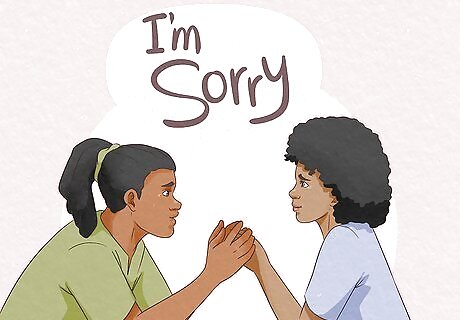
views
Communication

Talk about anything and everything with your significant other. Our partners can’t read our minds, and we can’t read theirs, so we all have to learn how to express ourselves clearly. Tell your partner how you’re feeling and what your wants and needs are, and make sure you’re actively listening when they talk about their own feelings, wants, and needs. If you’re able to communicate well, conflicts will be much easier to deal with when they arise. The words you say and your tone of voice are important here—use “I” statements and remain respectful, even when you’re having a disagreement.
Trust

To develop trust, stick to your word and do what you say you’re going to do. Your significant other needs to do the same, and you’ve both got to be accountable when you make mistakes, which is bound to happen—we’re all human! When something does happen, give your partner the benefit of the doubt instead of jumping to conclusions. Trust that your partner has your best interests in mind and that they’ll support you when you need it. Then, do the same for them.
Respect

It's important to respect your partner as a person. Also, respect their interests, opinions, and friends, and ask that they do the same for you. When you have mutual respect for each other, you’ll be able to resolve conflicts more effectively. Listen to their point of view, even if it differs from your own, and try to see where they’re coming from. Communicate respectfully, even when you disagree. Avoid name-calling or making rude or hurtful comments.
Loyalty

Be committed to the relationship and have each other’s backs. If you’ve agreed to be monogamous, make sure you are. Beyond staying faithful to your partner, support them and take their side whenever possible. Approach issues and conflict as a united front, keeping in mind that your goal is to stay together in a happy, committed relationship. Cheating is one of the leading causes of relationship problems and break-ups. If your needs aren’t being met and you’re tempted to cheat, it’s a sign that your relationship is in trouble. Talk to your partner about what you’re not happy with and work together to get things back on track.
Honesty

Tell your partner the truth, even when it’s hard. Share your feelings, dreams, hopes, and wishes with your partner so they know who you really are and what’s important to you. Ask them to do the same, and appreciate their vulnerability when they open up. Sometimes, it’ll be hard to tell the truth if you think what you have to say will upset your partner or disappoint them, but honesty is the best policy and if you have a good relationship, you’ll be able to work through it. Lying or keeping information from each other can quickly cause your relationship to unravel.
Independence

Be yourself and have your own interests, and allow your partner to do the same. Make time to do things that you like and spend time with people that care about you, and encourage your partner to do so as well. It’s healthy and necessary to take time away from each other to pursue your own interests and passions! Don’t let your own identity get lost in the relationship—it’s what your partner was attracted to in the first place. If you feel like you have to change who you are to be with someone, it’s probably not a good match. If your partner tries to control many aspects of your life and limits who you can see and what you can do, that’s a red flag.
Equality

Distribute power equally between yourself and your partner. Make decisions together and share responsibilities. Things won’t always be exactly 50/50, and sometimes one person may pick up more slack than the other. In general, though, your roles should be balanced and fair. If one partner has significantly more control than the other, it’s a red flag. No one has the right to tell you what to do or who to spend time with.
Compromise

You and your significant other aren’t always going to agree. That’s where compromise comes in. Instead of looking at conflicts as you against your partner, think about it as you and your partner against the problem. Work together to find a solution that you can both live with instead of focusing on “winning” an argument. Both people in a relationship need to fight fair. Take a break if things get heated and then come back to the issue when you’re ready to find a solution together.
Forgiveness

Both of you will make mistakes, so be willing to forgive each other. When you do mess up, be accountable for your actions and take steps not to repeat the same mistakes. Your partner should do the same. That way, you can forgive each other and move on. Don’t bring up old arguments or issues if your partner has apologized and you’ve worked through things—it’s not constructive and will likely lead to more conflict.
Friendship

Healthy romantic relationships have a foundation built on friendship. Wanting to spend time with your partner and do things together is a sign of a strong relationship. Build a friendship with your significant other and treat them like you’d treat a close friend—with kindness and compassion. Create traditions and try new things together. Make time to laugh and have fun, too!
Affection

Showing your partner how much you care and love them is important. Little things, like holding hands, hugging, and kissing, can make you feel more connected to your significant other. Make it a point to kiss your partner before they leave for the day and when they return home. Put your arm around them when you’re sitting together on the couch. This is especially important as your relationship ages—keep the romance alive by showing your affection. Write love notes for your partner, send them songs that make you think of them, or bring home their favorite meal or treat. Little acts of love and affection really go a long way.
Intimacy

Sex is a big part of a romantic relationship, and an important one. In the strongest relationships, both partners are sexually satisfied. Though it can be awkward at first, take time to talk about sex with your significant other. Ask what they like, what their fantasies are, and be willing to try new things. That said, neither person should feel pressured to do anything that makes them uncomfortable or that they don’t want to do. Respect each other’s boundaries when it comes to intimacy.















Comments
0 comment